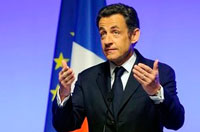France’s return to NATO may bring unpleasant surprises to Washington
The Parliament of France approved Nicolas Sarkozy’s decision to bring France back to NATO. Sarkozy took a great risk in his initiative: he could lose the support of the government. It would not be correct o say that France’s decision to return to NATO is a landmark victory of the United States. Quite on the contrary, the participation of France in the alliance may create quite a number of serious problems for Washington.

Deputies of the National Assembly of France approved the idea to retrieve the country’s NATO membership. NATO members must approve the decision of the French administration during the summit, which is slated to take place on April 3-4, although it does not seem that any problems could arise at this point.
Making a speech last week in Paris, President Sarkozy said that France, which pulled out from the alliance in 1966 under Charles de Gaulle, would retrieve its membership. Sarkozy particularly said that France must take an important place in the organization to become stronger and more influential, albeit independent. The French president added that it would help the country in the struggle against terrorism, the proliferation of nuclear weapons and other modern-day threats.
Sarkozy was supposed to win the support of more than a half of the National Assembly deputies, as well as the same amount of senators’ votes. Sarkozy’s party fellows take 317 of 577 seats in the lower house and 151 of 343 seats in the upper house. He needed to win the support of socialists and communists. However, Sarkozy’s followers did not prove to be reliable.
A deputy with the Union for Popular Movement said that France virtually never left NATO. France will actually return to the command structure of the alliance, taking into consideration the fact that France takes an active part in Afghanistan and Kosovo missions.
Another deputy of the same party said that he did not see a reason for France to join any organization, because it would not help to strengthen the country’s influence in the alliance. Even if France joins NATO, it will not be able to change the essence of the organization, since it is solely a US machine.
French Prime Minister Filon decided to link the NATO voting with the vote of no-confidence to the government. Many French experts said that it was an attempt of the ruling majority to show pressure on the deputies not to let them vote against the government on account of the forthcoming elections, the preparations to which depend on the government.
France pulled out from NATO in 1966. Then-President Charles de Gaulle explained the decision with a need to conduct US-independent foreign policies. It goes without saying that France’s relations with the United States worsened after De Gaulle’s decision. He ordered foreign military men to leave France. NATO’s headquarters moved from Paris to Brussels in 1966 too.
Formally, France remained a NATO member. The country continued to share its intelligence information with the allies, to take part in political meetings of the alliance and even participated in military operations in former Yugoslavia and Afghanistan. France was not involved in the planning of those military operations, and French generals were not included in the military command.
It is worthy of note that Sarkozy is a member of the party, which was founded by Charles de Gaulle. The party’s wing, which supports the nation’s US-independent political course, is still very strong. However, Sarkozy has been a long-time supporter of developing closer ties with Washington: his aspiration came contrary to political views of his predecessors within 40 years.
At the same time, Sarkozy had to find compromises with those who opposed the development of cooperation with the USA. Sarkozy believes that France’s return as a full-fledged NATO member would improve Europe’s role in the alliance. In addition, he supports the idea of creating the NATO-independent army of the European Union. Therefore, it is not clear yet, whether the United States is going to be pleased or displeased with the return of the great European nation.
Vadim Trukhachev
Subscribe to Pravda.Ru Telegram channel, Facebook, RSS!



